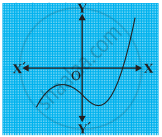Advertisements
Advertisements
प्रश्न
The zeroes of the quadratic polynomial x2 + kx + k, k ≠ 0 ______.
विकल्प
Cannot both be positive
Cannot both be negative
Are always unequal
Are always equal
उत्तर
The zeroes of the quadratic polynomial x2 + kx + k, k ≠ 0 cannot both be positive.
Explanation:
Let p(x) = x2 + kx + k, k ≠ 0
On comparing p(x) with ax2 + bx + c, we get
Now, a = 1, b = k and c = k
`x = (-b +- sqrt(b^2 - 4ac))/(2a)` ....[By quadratic formula]
= `(-k +- sqrt(k^2 - 4k))/(2 xx 1)`
= `(-k +- sqrt(k(k - 4)))/2, k ≠ 0`
Here, we see that
k(k − 4) > 0
⇒ `k ∈ (-oo, 0) u (4, oo)`
Now, we know that
In quadratic polynomial ax2 + bx + c
If a > 0
b > 0
c > 0
or a < 0
b < 0
c < 0
Then the polynomial has always all negative zeroes.
And if a > 0, c < 0 or a < 0, c > 0
Then the polynomial has always zeroes of opposite sign
Case I: If `k ∈ (-oo, 0)`
i.e., k < 0
⇒ a = 1 > 0, b, c = k < 0
So, both zeroes are of opposite sign.
Case II: If `k ∈ (4, oo)`
i.e., k ≥ 4
⇒ a = 1 > 0, b, c > 4
So, both zeroes are negative.
Hence, in any case zeroes of the given quadratic polynomial cannot both be positive.
APPEARS IN
संबंधित प्रश्न
The graphs of y = p(x) are given in following figure, for some polynomials p(x). Find the number of zeroes of p(x).

If ∝ and β are the zeros of the polynomial f(x) = `6x^2 + x - 2 `find the value of `(∝/β+∝/β) `
If the zeroes of the polynomial `f(x) = x^3 – 3x^2 + x + 1` are (a – b), a and (a + b), find the values of a and b.
If one zero of the quadratic polynomial x2 + 3x + k is 2, then the value of k is ______.
The zeroes of the quadratic polynomial x2 + 99x + 127 are ______.
If the zeroes of the quadratic polynomial ax² + bx + c, c # 0 are equal, then ______.
The zeroes of the quadratic polynomial x² + 1750x + 175000 are ______.
A polynomial of degree n has ______.
If 4x² – 6x – m is divisible by x – 3, the value of m is exact divisor of ______.
The number of polynomials having zeroes – 3 and 4 is ______.
